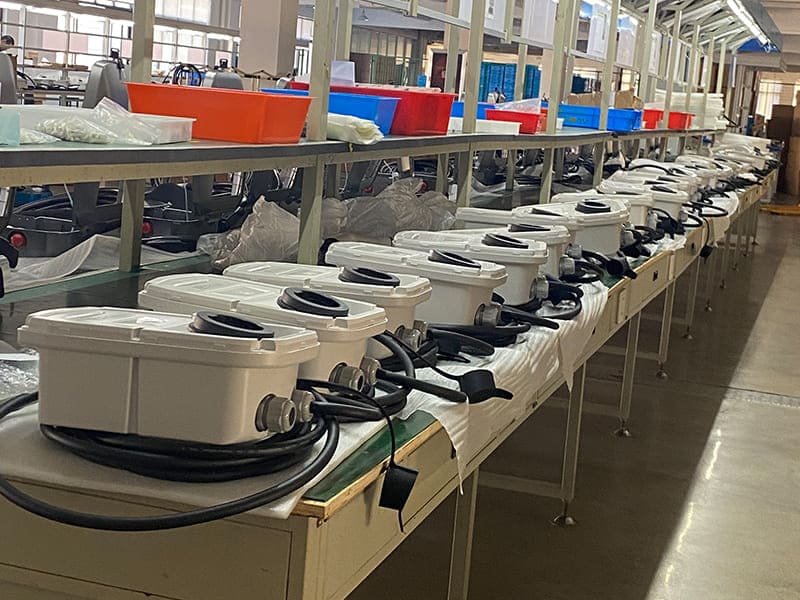Understanding Residential EV Charger costs is essential. Prices vary based on type and features. This guide breaks down all expenses clearly. Consequently, you can budget effectively.
Key Cost Factors
Several factors influence your final investment. The Residential EV Charger type matters most. Additionally, installation complexity affects the price. Electrical panel upgrades add significant costs. Permits and inspections are also necessary.
Furthermore, smart features increase the price. Brand reputation and warranty play roles. Always get multiple quotes for comparison.
AC Charger Options: Wall-Mounted Solutions
AC chargers are popular for homes. They use 240V power like dryers. The 7kW Residential EV Charger is common. It provides about 25-30 miles per hour.
The 11kW unit offers faster charging. Meanwhile, the 22kW version is fastest. However, it requires substantial electrical capacity.
Typical hardware costs range from $200-$500
DC EV Fast Charger Options: Quick Start Columns
DC EV fast chargers are less common residentially. The 20kW Residential EV Charger is compact. It delivers 60-80 miles in 30 minutes. The 30kW model offers even faster charging.
These units require three-phase power typically. Consequently, installation is more complex. Hardware costs start around $1200.
Installation Expenses Explained
Professional installation is highly recommended. Electricians charge $50-$100 per hour. Simple installs might take 2-3 hours. Complex projects require 8+ hours.
Panel upgrades cost $1,000-$3,000 if needed. Permits add $50-$200 to the budget. Always include these in your planning.
Government Incentives and Rebates
Many regions offer financial incentives. These reduce your net Residential EV Charger cost. Federal tax credits might cover 30%. State programs provide additional rebates.
Utility companies also offer discounts. Research all available programs locally. This can save you thousands overall.
Aegen: Direct Manufacturer Support
Aegen is a EV Charging station leading Chinese manufacturer. They produce reliable Residential EV Charger units. Specifically, they offer direct factory sales. This eliminates middleman markups.
Moreover, Aegen provides custom solutions for distributors. Their technical team supports installation planning. They ensure compatibility and optimal performance.
Long-Term Operational Costs
Consider electricity rates in your area. Time-of-use plans can save money. Charging overnight is often cheapest. Maintenance costs are generally low.
Calculate your expected monthly energy use. This helps estimate ongoing expenses accurately.
Choosing the Right Residential EV Charger
Assess your daily driving needs first. Then, check your electrical system’s capacity. Balance upfront costs with convenience needs. Consider future vehicle requirements too.
A 7kW AC unit suits most homeowners. DC fast chargers serve unique high-demand cases.
Conclusion: Investing Wisely
A Residential EV Charger is a valuable investment. Costs range from $1,000 to $25,000+. Choose based on your specific situation. Utilize available incentives to reduce expenses.
Partner with quality manufacturers like Aegen. They offer direct pricing and reliable products. Enjoy the convenience of home charging every day.
Installation Expenses Explained
Professional installation is highly recommended. Simple installs might take 2-3 hours. Complex projects require 8+ hours.
Government Incentives and Rebates
Many regions offer financial incentives. These reduce your net Residential EV Charger cost. Federal tax credits might cover 30%. State programs provide additional rebates.
Utility companies also offer discounts. Research all available programs locally. This can save you thousands overall.
Aegen: Direct Manufacturer Support
Aegen is a leading Chinese manufacturer. They produce reliable Residential EV Charger units. Specifically, they offer direct factory sales. This eliminates middleman markups.
Moreover, Aegen provides custom solutions for distributors. Their technical team supports installation planning. They ensure compatibility and optimal performance.
Long-Term Operational Costs
Consider electricity rates in your area. Time-of-use plans can save money. Charging overnight is often cheapest. Maintenance costs are generally low.
Calculate your expected monthly energy use. This helps estimate ongoing expenses accurately.
Choosing the Right Residential EV Charger
Assess your daily driving needs first. Then, check your electrical system’s capacity. Balance upfront costs with convenience needs. Consider future vehicle requirements too.
A 7kW AC unit suits most homeowners. DC fast EV chargers serve unique high-demand cases.
Conclusion: Investing Wisely
A Residential EV Charger is a valuable investment. Costs range from $200 to $1200+. Choose based on your specific situation. Utilize available incentives to reduce expenses. EV Charger Level 1, 2, 3: Costs, Speeds & Pros/Cons.
Partner with quality manufacturers like Aegen. They offer direct pricing and reliable products. Enjoy the convenience of home charging every day.

